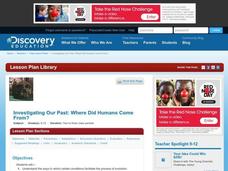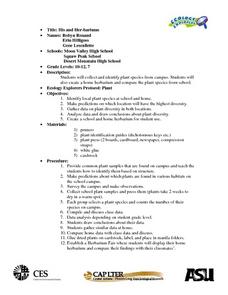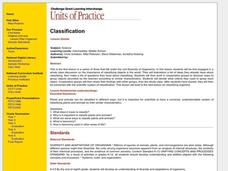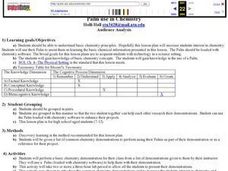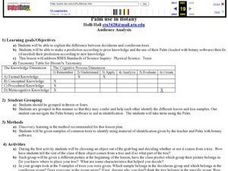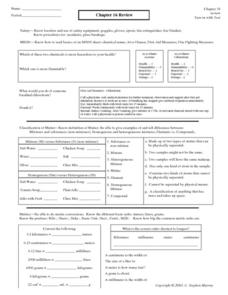Curated OER
A Tree Grows in Brooklyn
Students study A Tree Grows in Brooklyn using Bloom's Taxonomy. For this language arts lesson, students discuss the chapter and complete a worksheet. Students illustrate an experience they have had that is similar to a situation in the...
Curated OER
Classification
Second graders sort insects into groups by determining similar characteristics. They role play as Entomologists to sort insects.
Curated OER
Draw Me a Mammal!
Fifth graders illustrate at least three art elements in a drawing of a mammal they've read about with 100% accuracy. As a review, Bloom's Taxonomy questions are asked as they prepare to sketch something they pictured in the story they read.
Curated OER
Classify the Microbes
Students classify microorganisms into categories based on their characteristics. Pupils use a taxonomic key to identify organisms. They classify certain bacteria, protists, and viruses using a classification or taxonmic key.
Curated OER
Keying Rocks
Fifth graders observe several examples of types of rock and write about their similarities and differences in their science journals. They discuss their observations and discover that rocks are grouped according to the scientific...
Curated OER
Discovering Dichotomous Keys
Students become familiar with the structure and use of dichotomus keys. They demonstrate a comprehension of the fundamental principles of taxonomy by classifying organisms from a local ecosystem. Students are introduced to the term...
Curated OER
An Introduction to Dichotomous Keys
Young scholars pretend to be shark biologists employed by the National Oceanic and Atmospheric Administration (NOAA) who have been flown into the coastal city of Sao Luis in Brazil because locals have noticed an unidentified shark at...
Curated OER
Classification
Fifth graders analyze the necessity of classification. They distinguish between living and nonliving things in our world and recognize the six life functions of living things by identifying 15 classroom objects.
Curated OER
Oobleck
Students examine states of matter. In this solids and liquids lesson, students conduct a scientific investigation that requires them to make oobleck and record their observations pertaining to it.
Curated OER
Rule It Out
Here's a way to create math fact flash cards! Learners create their own cards and sort them into matching categories. Students start with addition and work their way up to harder math such as multiplication, and are asked to notice...
Biology Junction
Protists and Fungi
It's alive, but what is it? Protists share similarities with plants, animals, and fungi without being classified as any of those three. Learn more about protists and the kingdom fungi with a short presentation. It describes the parts of...
Curated OER
Arizona Plant Booklet: An Introduction to Arizona Plants & Cacti
Learners explore variety of plants & cacti in their Arizona community by collecting samples and taking photographs. Can be adapted to other areas.
Curated OER
Investigating Our Past: Where Did Humans Come From?
Investigate the theories of human evolution. In this research based lesson plan, learners research and discuss how geographic isolation, interbreeding, generalization, and specialization are factors in the history of humans. Groups work...
Biology Junction
Mollusks
Mollusks created every shell on Earth. Young scientists learn more about the phyllum mollusca in an informative presentation. It covers their characteristics, body plans, and relationships in the ecosystem. Then, it details each class of...
Curated OER
Science: Her-bariums Galore!
Students collect and identify plant species and construct herbariums both at school and at home. By gathering data from both locales, they draw conclusions and make predictions about plant diversity. Upon completion of the exercises,...
Biology Junction
World of Insects: Characteristics, Orders, and Collecting
Every bug is an insect, but not all insects are bugs. A presentation lists the characteristics of insects, describes their body parts, and explains metamorphosis. It also details every order and includes photographs and multiple facts...
Curated OER
Primate Classification 2006
Students examine groups of hierarchy and see how primates are categorized. In this primate classification lesson students view video and slides then examine the taxonomy of primates.
Curated OER
Classification
Students investigate how to classify items based on similar characteristics. They study the scientific system of classification.
Curated OER
Palm use in Chemistry
Students use a Palm loaded with chemistry software to assist them in gaining information presented in a lesson about basic chemistry principles. They perform a basic chemistry demonstration for their class using information from received...
Curated OER
Palm use in Botany
Students use a Palm loaded with botany software to assist them in deciding if items are produced from trees. They identify local deciduous and coniferous trees.
Curated OER
Chapter 16 Review- General Science
In this review of general science worksheet, students classify examples of matter as mixtures or substances, homogeneous or heterogeneous mixtures, or elements or compounds. Students also convert several examples using the standard...
Curated OER
Big Cat Classification
First graders discover the different names and classifications of big cats by using word processing applications. For this animal life lesson, 1st graders investigate one big cat and create a database of facts about it using an...
Curated OER
Tree I.D.
Students explore various tree species. In this tree species lesson, students collect leaves on nature walks and use Internet sources to identify the trees that the leaves belong to. Students graph their data as well.
Curated OER
Using the Tools in Your Community
Third graders research a profession in their community that uses tools to help the community. In this professions lesson plan, 3rd graders complete computer research to research the profession and present it to the class.














